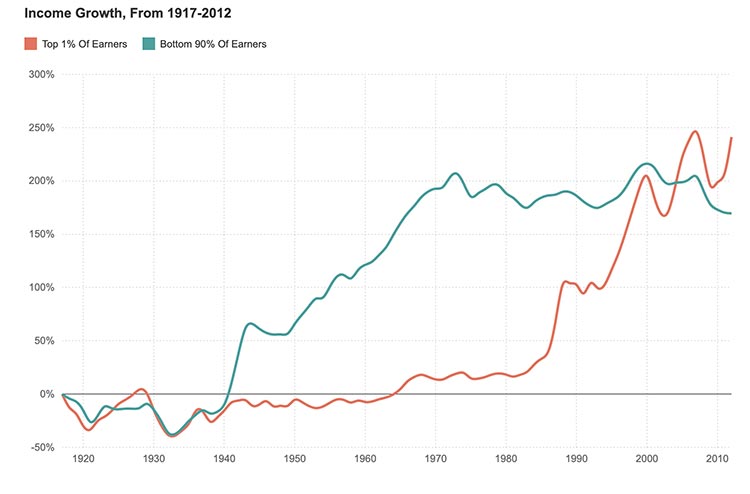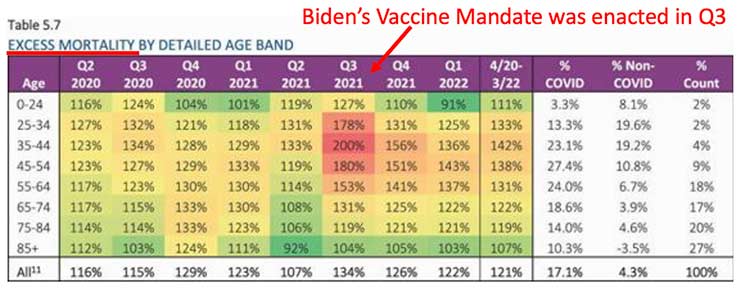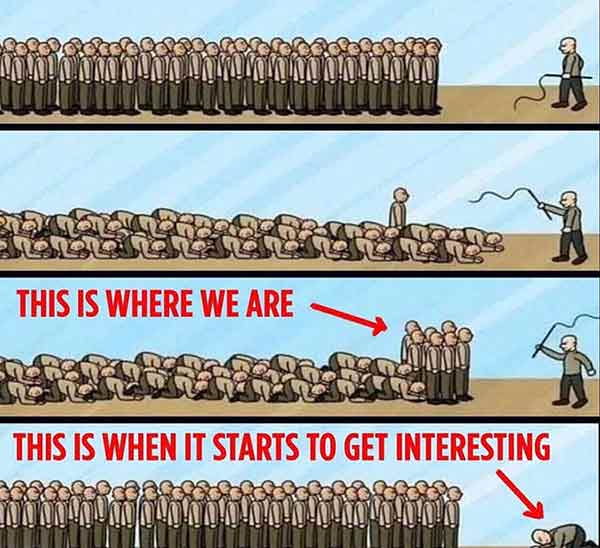
STORY AT-A-GLANCE
- There has been a push to address historic inequalities throughout society by selecting individuals on the basis of their race rather than their merit. Many oppose doing this because it is discriminatory, highly divisive and significantly lowers the quality of organizations that do not select the most qualified individuals to fill each position
- When individuals are selected for universities on the basic of meeting a racial quota rather than their merit, it is known as affirmative action. Highly divided opinions exist within the medical field on if patients benefit or are harmed by affirmative action
- A recent supreme court ruling has outlawed affirmative action. This article will attempt to present a balanced perspective on the ruling and its implications of it
Diversity equity and inclusion (DEI) is an immensely controversial subject. I believe this controversy has arisen since people have strong reasons to support either side of the argument and because it is being forced upon us by both the government and multinational corporations.
For example, ESG scores have been used as a metric to calculate the social value of corporations, and a vital component of an ESG score is the company's commitment to advancing diversity both within the company and in society.
Since ESG scores are used by many (such as Blackrock — the largest asset holder in the world) to determine which corporation to invest in, a lot of money is at stake, and many corporations have gone to great lengths in promoting left-wing causes to attract ESG-focused investors.
Note: In 2023, Vanguard (the second largest asset holder) distanced itself from ESG investing, with its CEO arguing that ESG investing is incompatible with Vanguard's fiduciary duties to the investors. Fewer than 1 in 7 of Vanguard's active equity managers outperformed the broad market in any five-year period, and none of them relied exclusively on a net-zero (ESG) investment methodology.
Depending on how one looks at it, I believe any of the following can be argued about DEI:
- It's an attempt to address a legitimate issue.
- It's a smokescreen.
- It's a power play.
- It's a mass formation.
Although many of the initial justifications for DEI were valid, at this point, it has transformed into something accomplishing the opposite of what was initially intended. In many cases, the harm of DEI is only evident if you are actively involved in the field it affects. Since I am in medicine, my focus will be on how DEI has affected medicine, but much of what I say holds for other fields as well.
Inequality and Discrimination
There are two ways to amass wealth and power:
- Producing something of immense value.
- Stealing from others.
The first sometimes happens. For example, after World War 2, since the war didn't touch America's soil, America had an intact industrial base the rest of the world was eager to purchase from and America rapidly experienced a boon in wealth that saturated the society. For context, in the 1950s, a black high school dropout working reasonable hours in a factory could afford to buy a house and support a stay-at-home wife raising his family.
Typically, however, the second happens. One of the primary issues of our era (which became much worse during the pandemic) is that the wealth that used to be available to all of America has been sucked up by the 1%, which amongst other things, has created a situation now where jointly-employed married couples, trapped in debt, cannot afford to start a family yet alone buy a home.

Note: The most significant acceleration in this trend occurred during COVID-19. As many lost their livelihoods (e.g., 34% of small businesses closed during the pandemic), the combined wealth of all U.S. billionaires increased by $2.071 trillion (70.3%) in only 19 months.
Furthermore, a 123% increase happened for the five wealthiest billionaires (Bezos, Gates, Zuckerberg, Page, and Musk), almost all of whom used the tools available to them to both push the pandemic narrative and censor anyone who challenged it (e.g., by providing ways to treat COVID-19 and end the pandemic that no one could patent and profit off of).
I believe this shift was deliberate and enacted by a globalist group that preceded the World Economic Forum and came to prominence during the Carter administration (Carter was elected in 1976) with the stated goal of creating a society revolving around economic feudalism.
This model replaced the lords of the feudal era with large corporations, and rather than using armies to force the general populace (who in the feudal period were known as serfs) to work for those lords, economic incentives (e.g., needing a job) is used to enforce their compliance.
One awful illustration of the power of this model were the unjustifiable (and later ruled to be illegal) vaccination mandates enacted across corporate America which put many in the position of having to choose between not supporting their families or taking a severe risk to their health. Many felt gravely violated by this policy but ultimately complied, which, as Ed Dowd showed, had catastrophic consequences for America:

Note: Many have argued both the DEI "mandates" and the vaccine mandates have functioned as loyalty tests designed to remove right-wing individuals who did not wish to comply with either from positions of influence. This issue appears to be the most evident within the military, and quite a few people I know directly who were loyal to their country and fellow Americans have left the armed services due to the current administration's actions.
Throughout history, colonial powers have also acquired wealth by stealing it (colloquially known as exploiting colonial subjects). Implementing these policies, in turn, required negative attitudes to exist toward the colonial subjects so that there would be no guilt in enslaving and exploiting them. Since many (but not all) of the colonies were of different ethnicity, these economic policies encouraged racial discrimination toward the colonial subjects.
As a result, tremendous racism can be found worldwide, and far too many books can be written about the horrific deeds both Western and non-Western nations have committed to advance their national economic interests. For example:
"Indigenous people both north and south were displaced, died of disease, and were killed by Europeans through slavery, rape, and war. In 1491, about 145 million people lived in the western hemisphere. By 1691, the population of indigenous Americans had declined by 90–95 percent, or by around 130 million people."
Since the degree of racism in America has massively declined over the last century, it is difficult to appreciate the attitudes that used to be widespread throughout the nation or the degree of horrific exploitation which were previously normalized against many "undesirable" segments of society.
Divide and Conquer
The struggle the ruling elite always faces is how, with their limited resources, they can effectively control a much larger segment of the population, which understandably does not want to be exploited and cannot be if they stand together.

One of the most commonly utilized approaches is to take advantage of the tribalistic attitudes inherent to the human species and use them to split the exploited populace into two camps that each blame the other for what the parasitic ruling elite is doing to both of them.
I first really grasped this after I read A People's History of The United States (a progressive classic) and learned that in addition to African slaves, European slaves (known as indentured servants) also came to America and worked on the plantations. Both the white and black slaves were treated poorly by the landowners, and once the landowners realized their slaves were becoming friends, they pitted their slaves against each other through racial divisions (which was largely successful).
Note: The slavery we used to see worldwide has largely been outsourced to the third world (e.g., in sweatshops or largely invisible forced labor) since that, rather than overt slavery, is now the most efficient way to profit off other human beings.
It's hard to choose a single example. Still, if I had to, I'd argue the most devastating implementation of the divide and conquer strategy was conducted by the British Empire. The British intentionally had the boundaries of their colonies (which later became national boundaries) drawn, so they contained opposing groups and encouraged divisions between those tribes during their rule.
In many cases, this resulted in war breaking out between those tribes after the British left, and many of the longest-running conflicts in the world are a product of this approach.
Since learning all of this, more and more, I've come to appreciate how much society trains us to focus on how we are different from our fellow Americans (when the reality is that we have so much more in common than where we differ). Likewise, as the years have gone by, I've gotten better and better at noticing how often polarized divisions (e.g., gender is a common one now) are created to wedge us apart.
Note: A common way those in power neutralize parties that threaten their power (e.g., activist groups) is by encouraging divisions in the groups opposing them so the group turns on itself. I've seen this take place in many causes I've participated in, and this is why I've repeatedly spoken out against attacking leaders in the vaccine safety movement that I believe is trying to do the right thing.
Recently, a reader sent me a 1947 "propaganda" video the US military made to prevent Nazism from entrenching itself within the United States. What I found so fascinating about this ancient video is that it perfectly describes the divisions now being created in the name of DEI:
Throughout history, people who were able to productively dismantle the structures used by those in charge to control the general populace have periodically emerged. Two of the most well-known examples were Mahatma Gandhi and Martin Luther King Jr. (who was inspired by Gandhi).
Each of them emphasized non-violent protest (as using violence would be turned against the protestors) and working to reverse social divisions so the common people could unite and would no longer permit the exploitative systems to remain in place. This sentiment is encapsulated within MLK's famous speech, which stated:
"I have a dream that my four little children will one day live in a nation where they will not be judged by the color of their skin but by the content of their character."
It is thus quite tragic that those who cite MLK in their push for DEI are working so hard to again make race be the primary determinant of how people are treated.

Download this Article Before it Disappears
Download PDFDiscrimination in Medicine
Throughout modern history, doctors have always been agents of the state that advanced whatever policy the government put forward. One of the most well-known horrific examples occurred in Nazi Germany, where the German medical profession, rather than honoring their Hippocratic Oath, facilitated and often encouraged the eugenics policies of Nazi Germany (e.g., executing or sterilizing the members of society deemed to be unfit for the nation).
The medical profession has also supported many other abhorrent policies (e.g., the abysmal and arguably genocidal treatment of colonized communities). There has also been a long history of unethical human experimentation in the United States (some of which is summarized here), and in most cases, that research was done on marginalized members of society (since they are the easiest groups to use as Guinea pigs).
Many of these experiments thus were conducted on ethnic minorities, and sadly the Tuskegee experiments are just the tip of the iceberg of what transpired (e.g., consider the abhorrent work of Marion Sims or the radiation experiments conducted by the military).
Likewise, the quality of medical care is often highly dependent on how wealthy someone is. As a result, minority groups that are also economically disadvantaged frequently receive much poorer medical care and are even more distrustful of the medical system.
Since the DEI movement has encouraged drawing attention to societal inequalities, the push for DEI has also entered the medical profession. Over the last few years, it has grown to the point it has become an ideology, and many are trapped within a mass formation where anything that supports DEI is good. In contrast, anything that criticizes it is terrible, irrespective of how much the specific policy benefits patients. As the years go by, I hear more and more examples of this. These include:
•Medical education openly promotes the "woke" ideology, even if it is at odds with basic medical science.
•Hearing stories of individuals questioning the rush for DEI being excommunicated for doing so. For example, this was shared with me by Richard T. Bosshardt, MD, FACS:
"In June 2020, in the wake of the George Floyd's death, the leadership of the ACS assembled its own Task Force on Racism to deal with, as they explicitly stated, "structural racism in the ACS," declaring that its own (white) surgeons were implicitly racist and that the practice of surgery was racist as well.
The only evidence given for any of this was disparities in representation of blacks in the ACS and some studies showing poorer outcomes in surgery in black patients compared to white patients. Racism was to blame and no other causes for these disparities were entertained. The ACS went so far as to suggest that black patients might have better outcomes if their surgeon was also black.
The task force recommendations were essentially a primer on how to incorporate DEI/CRT into an organization. These included adding antiracism to the ACS values, installing a Department of Diversity with its own Director as part of the leadership of the ACS, implementing training in implicit bias, microaggressions, and ally/active bystander, and even adding a sixth, Diversity Pillar, to the other five pillars in the ACS.
All of this struck me as terribly wrong. It was a slap in the face of all surgeons of every race and ethnicity who do their very best, every day, for every patient regardless of the patient's race or ethnicity, and I said so in a post on the online discussion forums of the ACS website. I was then banned for life from the ACS in clear violation of the ACS own bylaws for disciplinary matters."
Likewise, another surgeon I've corresponded with, James Miller, shared that before COVID-19, DEI had taken over his hospital to the point that surgeons were not allowed to question harmful things they saw being done in the name of DEI, and minor "discriminatory" verbal missteps surgeons there made (which had no malice behind them) resulted in severe sanctions being leveled against those surgeons.
Conversely, once the COVID-19 vaccines became available, he observed active discrimination against unvaccinated patients (which repeatedly directly harmed those patients), but no one objected to it. This put Dr. Miller in the awkward position of having to either follow his longstanding creed as a surgeon and treat every patient he saw to the best of his ability (regardless of how he disagreed with them) and upset his colleagues or fail to uphold his responsibility as a physician.
He chose to do the former, set up a free clinic to help these patients, and eventually had to leave the state to protect his medical license because of the retaliation he faced for his choice.
Dr. Miller's experience reminds me of a tidbit a friend shared decades ago: "Liberals don't get that you can't hate hate." In my eyes, one of the major issues with the current push against racism is that it's focused on superficial ideas of what racism is (e.g., Europeans are bad because they were racist) rather than the need for each human species to move beyond hating those who come from tribes different than their own.
This, for example, is why you can have people who, on the one hand, get up in arms about the slightest microaggression they see a colleague commit but simultaneously don't have a second thought about actively discriminating against groups they are told to despise (e.g., the unvaccinated).
Note: As far as I can tell, this push to discriminate against those who resisted vaccine mandates began in 2015 when a coordinated PR campaign was launched across the United States following a "catastrophic" measles outbreak (which no one died from).
This PR campaign paved the way for widely protested school vaccine mandates across the country and appeared to have been the opening salvo in the push for adult vaccine mandates we witnessed not long after during COVID-19. What really bothered me about the 2015 campaign was how many left-wing colleagues I had watched extoll the importance of compassionate care for every single patient then actively wish death upon the children who failed to vaccinate.
Smokescreens
A common PR strategy to get out of trouble for getting caught doing something horrendous is to create a token initiative that casts one in a positive light and then divert everyone's focus to that initiative. For example, egregious polluters who get caught polluting (and continue to pollute because it makes money) will often create token environmental initiatives and excessively promote that initiative to recast themselves as stewards of the environment.
Amazingly, this strategy is extremely effective and has led many environmental activists to term it "green-washing" (a wordplay on whitewashing the crimes).
DEI is the currently in-vogue smoke screen, partly because of the current mass formation around it and partly because any commitment to DEI is a token initiative that does not affect anyone's bottom line. This, for example, is why major corporations like Apple and Nike frequently commit to social justice while utilizing sweatshops that exploit vulnerable people overseas.
People have a lot of reasons to be dissatisfied with the medical field, especially after the debacle we witnessed during COVID-19. However, rather than address these issues, I've just watched the profession repeatedly double down on DEI.
For example, I was sent a report compiled by a (large) special commission appointed by one of the organizations in charge of assessing medical students across America (e.g., by making board examinations). It was tasked with addressing some of the major issues created by COVID-19 (e.g., many medical students during the pandemic somehow did their clinical rotations virtually).
I read the report and noted there was very little which appeared to address these issues (e.g., training doctors in things the public wants them to know), but I did notice about 25% of it was focused on advancing DEI through:
- Making sure all races were equally represented in board examination questions (e.g., in pictures).
- Make sure the language is more sensitive and inclusive (e.g., say "a woman with hypertension" rather than a "hypertensive woman").
- Evaluate removing questions that suggest differences exist between races for specific medical conditions or physiologic parameters (to some extent, this point was valid but the issue they cited had already been widely adopted by the medical profession).
- Increase the diversity of individuals writing exam questions.
This approach makes it possible to avoid attacking anything controversial (e.g., threatening a pharmaceutical interest) while still making it look like something productive is being done. It is thus an irresistible PR opportunity.
One colleague (who works at a very left-wing medical school) told me they'd been visited by consultants to help the school maintain its accreditation (schools periodically have to pass that).
There are a variety of significant issues with that school (which needed to be improved to graduate competent physicians), yet after the consultant looked everything over, the consultant declared that the number one priority was to foster DEI since the accrediting bodies placed a heavy weight on it and hence proposed a variety of measures that could be done to strengthen the school's commitment to DEI.
My colleague specifically shared this with me because their school's mission statement revolved around DEI and was already going very far to promote it.
Note: One recent story illustrates why DEI violates the ethical standards we expect to be upheld in medicine.
On December 27, 2021, New York's Department of Health, citing a lack of available antivirals to treat COVID-19 issued guidelines stating the use of those medications needed to be reserved for patients at higher risk of severe COVID-19. It then went on to say that being any race besides white qualified as "high risk," thereby precluding many white people from being able to receive the therapy.
Affirmative Action
One of the central beliefs in DEI is that people of all races need to be equally represented in positions of power within society. Since education is often the pathway to these opportunities, DEI proponents have argued that an equitable admissions process must ensure that all races are evenly represented in those admitted to the schools.
On the surface, this is quite reasonable. Unfortunately, the racial distribution of qualified applicants does not match the equitable racial distribution each school wants in its class. This, in turn, forces them to either admit based on merit (and not have the sought-after DEI metrics) or to admit based on ethnicity and discriminate against qualified individuals with an undesirable race. Each of these choices understandably upsets a significant number of people.
I personally believe the previously described dilemma illustrates a common issue I encounter; the problem with false dichotomies. The lack of qualified applicants from the desired ethnicities in truth indicates something needs to be done to increase the number of qualified applicants. Given that decades of DEI policies have failed to address the root issue, this suggests more DEI policies are unlikely to fix them either.
For example, many underrepresented ethnic minorities live in high-crime areas, making it very difficult to develop the local economy or for students to pursue long-term goals by prioritizing academic success. This issue has existed for decades and, in many places, has gotten worse.
Likewise, many of the harms DEI advocates attribute to systemic discrimination against specific races are known to arise from poverty and can only be solved by addressing the poverty in the affected communities.
Sadly, while DEI proponents will frequently lament the hardships individuals born in those environments face to justify the need for affirmative action, they rarely do anything to address the underlying causes of these inequalities.
This is analogous to how much of medicine now revolves around treating symptoms rather than causes of illnesses. While this model is very profitable and frequently treats acute disease, it typically fails for chronic conditions (accordingly, research into the underlying causes of chronic illness is generally neglected by the medical profession).
Because the upper class is consuming more and more of the available economic resources, everyone is fighting more and more for the remaining pieces of an ever-shrinking pie. While it's quite understandable why people would want to do this, they would be much better served to understand why the pie they all share is shrinking and joining hands to fix it.
Medical Admissions
Everything described above also holds true for the even more elusive admissions to medical school. I would also argue there is a real need for diversity in the medical profession since doctors have such an enormous impact on the lives of others and many ethnic minorities are understandably distrustful of the medical profession.
Unfortunately, because of the need to attract a diverse class and the limited applicant pool, many medical schools have lowered the acceptable admission standards for a desired ethnicity applicant to be right on the threshold of the academic performance necessary to pass medical school.
This is a significant issue because if under qualified physicians become the doctors for these underserved populations, the quality of the medical care they receive significantly worsens (I have heard many distressing examples of this coming to pass).
Somewhat in parallel, my colleagues in academia have noticed more and more applications they see revolve around a commitment to diversity by the applicant rather than the traditional things looked for in the application process. Given the prevailing biases in academia, it makes sense why this is the path many shoot for.
Yet at the same time, I've repeatedly heard medical students remark that they know what they're saying is BS. Similarly, colleagues I directly know who got through medical school based on their diversity and repeatedly affirming their commitment to helping the underserved terminated that "commitment" the moment they completed their residency training.
Note: I was recently informed by a friend and professor at an Ivy League medical school that part of their accreditation is based upon the diversity of each class, and specifically for that reason, they have to pass over qualified candidates to meet the DEI metrics.
Conclusion
Although I have many criticisms of the DEI model, I also see a key argument that favors it. One school of philosophy argues that all social change is a product of conflicting ideas clashing with each other in society and an eventual compromise between them becoming the established norm.
If you posit that "DEI" has served that function in relation to "racism," then it is quite arguable the compromise that has been gradually reached between them (a significant reduction in genuine racism throughout America) is much better than what preceded the era of DEI. At the same time, this also means that much of the need for DEI no longer exists since DEI has effectively eliminated it.
Note: I am not sure if my argument entirely holds because much of the racial tolerance and colorblindness I used to observe has evaporated as people have become over-identified with their racial composition and the pain of their ancestors.
Unfortunately, since so many people’s DEI careers now depend on sustaining the need to fight racism, a problem which has largely disappeared, more and more things are we previously did not consider to be racism are being reframed as racist to sustain that industry. This sadly is a pattern I have observed in many other areas and brought me to believe "no group can ever be relied upon to solve a problem its existence revolves around solving."
Fortunately, since the recent Supreme Court decision applies to all educational institutions that receive federal funds (in other words, all of them), it is likely to make ripples for decades in the United States. Clarence Thomas (the only black man on the Supreme Court) likewise provided an unusually strong statement in the ruling:
"The great failure of this country was slavery and its progeny. And, the tragic failure of this Court was its misinterpretation of the Reconstruction Amendments, as Justice Harlan predicted in Plessy. We should not repeat this mistake merely because we think, as our predecessors thought, that the present arrangements are superior to the Constitution.
The Court's opinion rightly makes clear that Grutter is, for all intents and purposes, overruled [this signifies the weight of the decision]. And, it sees the universities' admissions policies for what they are: rudderless, race-based preferences designed to ensure a particular racial mix in their entering classes. Those policies fly in the face of our colorblind Constitution and our Nation's equality ideal.
In short, they are plainly — and boldly — unconstitutional. See Brown II, 349 U. S., at 298 (noting that the Brown case one year earlier had "declare[d] the fundamental principle that racial discrimination in public education is unconstitutional").
While I am painfully aware of the social and economic ravages which have befallen my race and all who suffer discrimination, I hold out enduring hope that this country will live up to its principles so clearly enunciated in the Declaration of Independence and the Constitution of the United States: that all men are created equal, are equal citizens, and must be treated equally before the law."
Because of the widespread public rejection of the unjustifiable COVID-19 policies, we are at a moment in time where massive reforms and improvements in healthcare are possible. It is my sincere hope this opportunity won't get diverted into smokescreens like DEI that allow the industry to divide us and sustain its unethical practices that place profits before patients. Statements like Justice Thomas's make me very hopeful we are moving in that direction.
A Note From Dr. Mercola About the Author
A Midwestern Doctor (AMD) is a board-certified physician in the Midwest and a longtime reader of Mercola.com. I appreciate his exceptional insight on a wide range of topics and I'm grateful to share them. I also respect his desire to remain anonymous as he is still on the front lines treating patients. To find more of AMD's work, be sure to check out The Forgotten Side of Medicine on Substack.
Views: 57
Comments are closed for this blog post
© 2025 Created by carol ann parisi.
Powered by
![]()

